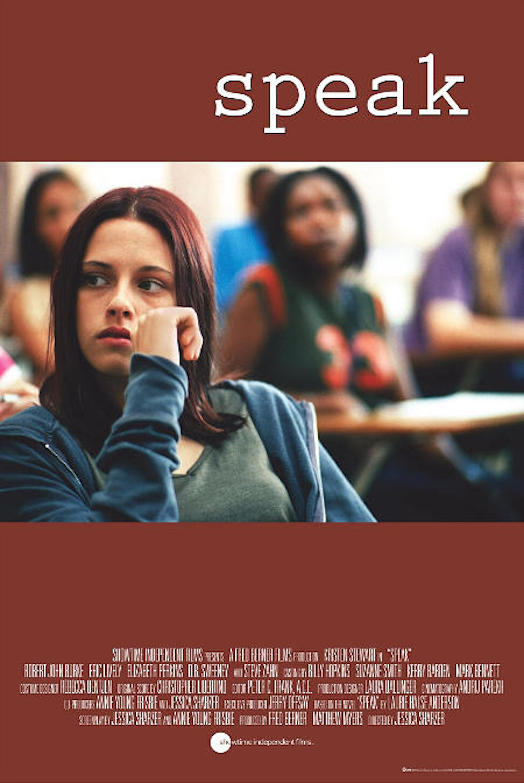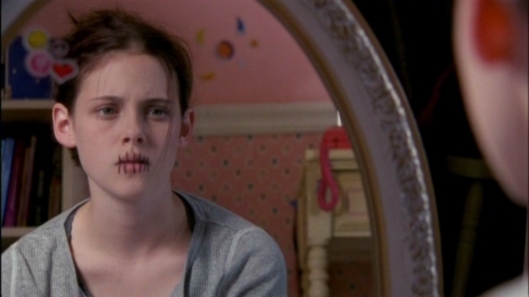Tags
Catch Up movie, Drama, Elizabeth Perkins, High School, Jessica Sharzer, Kristen Stewart, Literary adaptation, Review, Steve Zahn, Trauma
D: Jessica Sharzer / 89m
Cast: Kristen Stewart, Elizabeth Perkins, Steve Zahn, Michael Angarano, Allison Siko, Hallee Hirsh, D.B. Sweeney, Eric Lively, Robert John Burke, Leslie Lyles, Megan Pillar
It seems to be a truism that all actors and actresses only ever look forwards: to the next role, the next script, the next director in need of their talents. Ask them about past roles and a reluctance seems to set in. Oh, they’ll talk about the movies they made when they first started out, and they may even have fond memories of making some of them, but more often than not, it’s the next project that they’re really interested in. But audiences aren’t necessarily that focused, and fans even less so. They want the reassurance that said actor or actress will be making the same kind of movies that have made them famous. Familiarity breeds contentment, if you will. But what’s often interesting in an actor or actress’s career is the movies they made before they became truly famous, before they became a household name or achieved international recognition. Looking back can be just as advantageous as looking forward. After all, we know what they can do now, but what could they do back in the day?
Speak is a movie that Kristen Stewart made when she was just fourteen. It’s important to remember that, as the role of Melinda Sordino, a high school freshman who suffers a traumatic experience at a friend’s summer house party, requires her to portray a teenager you can actually identify with – and the reason she’s so good isn’t entirely because the character is well written. It’s as much a reflection on Stewart’s burgeoning talent as an actress as it is on the script by director Sharzer and co-writer Annie Young Frisbie (and itself an adaptation of the award-winning novel of the same name by Laurie Halse Anderson). Returning to school after the summer hiatus, Melinda finds herself ostracised by her friends, and treated like a pariah. The reason? At the party, Melinda called 911 but failed to tell the police why she was calling. However, the police traced her call and attended, prompting everyone to run for the hills (though why is never explained). Now, Melinda is regarded as a “squealer”.
With her best friend, Rachel (pronounced Rachelle) (Hirsh), ignoring her, and most of the other pupils whispering about her and giving her pointed looks, Melinda finds herself developing unexpected friendships with two fellow students, newbie Heather (Siko), and Melinda’s biology lab partner, Dave (Angarano). She also receives the help and support of her art teacher, Mr Freeman (Zahn), who encourages her to explore her feelings through an assignment he sets her. But still she struggles to deal with what happened to her at the party, something she’s told no one about, and something that stops her from trying to regain the friendships she used to have. As the school year progresses she begins to grow more confident in herself, and by its end has reached the conclusion that she needs to tell someone, anyone, about what happened to her. At first she wants to tell a stranger, but realises that there is only one person she should talk to. However, that person is Rachel, and what Melinda has to tell her may end their friendship for good.
Whatever your feelings about Kristen Stewart as an actress, it’s safe to say that the role of Bella in the Twilight saga was a game changer, and since that franchise ended in 2012, Stewart has made some eclectic choices and chosen a variety of roles and appeared in a variety of genres in order to escape being typecast as the somewhat dour heroine who rarely gets to smile. It was a straitjacket role, and there were times when Stewart seemed unable to give the role more than what was in the script. There are no such problems in Speak, a movie that looks at peer pressure in a compassionate, intelligent way, and how the devastating effects of a terrible experience can express themselves in ways that are positive and of benefit to the person concerned. Melinda’s ordeal is shown fairly early on, allowing the audience to sympathise with her and feel angry on her behalf. Of course, Melinda is still trying to deal with it all in her own way, and she seeks to withdraw from everyone while at the same time wishing everything could return to normal. Stewart highlights this dochotomy with an assurance that belies her age, and as Melinda’s emotions tug her this way and that, Stewart never loses sight of the different kinds of pain that she’s feeling, even as time goes on.
With Stewart giving such an impressive portrayal, it’s a shame that too much else stands out in poor relief. Melinda’s parents (Perkins, Sweeney) are too self-involved to even realise that their daughter is going through a bad time (even Melinda’s drawing lines on her lips in lieu of stitches is dismissed out of hand), and Burke’s racist history teacher bullies her in worse fashion than her friends (and gets away with it). And despite a good performance from Zahn, his freewheeling, rebellious art teacher feels contrived and/or stereotypical depending on the scene. But the main issue that may disappoint viewers is the idea that Melinda will spend much of the movie not speaking as a way of protesting what has, and is, happening to her. She even wonders how long it would take people to notice if she did. But in the end, she stays mute for two scenes and that is it for that idea. What could have made the movie more engrossing and challenging, instead is referenced on occasion and treated as a temporary affectation rather than a defined way of rebelling. At one point, Melinda is asked why a revolutionary is only as good as his or her analysis; she replies that you should know what you stand for, and not just what you’re against. This arrives too late to push the movie in a more dramatic direction, because even then Melinda’s avowal of this doesn’t mean that she’s any better equipped to deal with things or make a personal stand, just more determined to face up to them.
Having the action take place over a school year (with continual references to the holidays/special dates in order for the viewer to keep track of the time elapsing) means the movie is very episodic in nature, and as a result, it’s unable to maintain dramatic traction. Sharzer, whose sole feature credit this is so far, makes no effort to overcome this, leaving the viewer to wonder just what needs to happen to make Melinda start dealing with what happened to her. And too much of what does happen feels like it’s been lifted wholesale from other teen dramas, from the internal logic to the secondary characters to the way in which various subplots are left hanging as if waiting to be included in an extended director’s cut. It wouldn’t be fair to say that Speak is mostly shallow, but it doesn’t always reach the heights that Anderson’s novel attains, and its TV Movie of the Week veneer doesn’t help either. A bold choice, then, but one that lets down its source material, and in the process, its audience.
Rating: 6/10 – there’s a really great movie to be made from Anderson’s novel but sadly, Speak is only a middling effort that’s as good as it is thanks to Stewart’s perceptive, intuitive performance; engaging enough, and with a dry sense of humour that’s allowed to flourish from time to time, it’s a movie that has no trouble drawing in the viewer, but which then has to work extra hard to keep them interested, something that’s not quite so easily done. (28/31)



